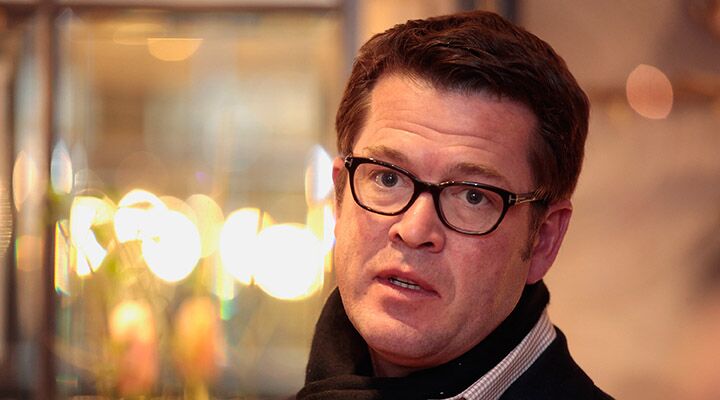
Guttenberg Condemns Europe’s Leadership
Europe is being overwhelmed with crises, and the current leadership cannot cope, former German Defense Minister Karl-Theodor zu Guttenberg said at the 2015 Fortune Global Forum on November 4.
Taking part in a panel discussion titled “Navigating Global Volatility,” Guttenberg began by discussing what he called the deepest crisis Europe has faced in the last couple of decades—the immigration crisis. He warned that it impacts some of the core elements of Europe and condemned the dramatic lack of leadership within Europe.
“The problem is we are stumbling from one necessary short-term solution to the next necessary short-term solution,” he said.
“You need a short-term solution for … probably 1.3 million refugees—highly uneducated by the way—in Germany this year,” he continued. “You need a short-term solution for how to deal with Austria. You need a short-term solution of what happens if we have our German Charlie Hebdo, which is only a matter of time …. We’ve been lucky so far”—referring to the terrorist attack last January in Paris which killed 11 people.
“You’ll need a short-term solution for energy prices that might be affected,” he said. “You need a short-term solution for this and this and this and that. And at the same time you have a construct of the European Union, which is constantly somehow involved or somehow affected by here an election, there an election, there an election ….”
“You are dealing … with a patient on the operating table where you have 28 very distinct, talented doctors standing around this operating table,” he explained. “And once in a while someone is stumbling over the plug of the heart-lung machine, and then the patient groans, and then they would put the plug back into the wall and everyone will be happy the patient is still alive. But again, another short-term solution.”
Guttenberg bemoaned the fact that no leader in Europe was willing to risk losing an election to make the decisions that need to be taken. This is “another breeding ground for growing nationalism in countries where you didn’t dream of growing nationalism,” he said.
He was also critical of Germany’s domestic politics, condemning the very worrying finger-pointing going on between the members of Germany’s coalition. He said that German Chancellor Angela Merkel is overawed by the idea of being a leader and that her style is to lead from behind, using ad-hoc solutions to deal with the problems of the day. There was a time she could have begun a Europe-wide debate on a substantive issue, he said, but not now—implying that his former boss has lost a lot of her stature in Europe.
However, Guttenberg didn’t see the crisis as all bad news. He said that it could lead to a “cathartic moment” where Europe puts an end to some of its founding lies and is forced to find real, long-term solutions for its problems.
He was equally critical of Europe’s leadership when it came to Russia. When asked if he thought Russia would invade the Baltic states, he gave a confident no. nato, he said, was not standing up to Russia. Russia could invade Europe all the way up to Moldova, and nato would do nothing. Why would Russian President Vladimir Putin take the risk of attacking a nato member when there’s so much other territory out there that he could be taking without that risk?
The final question of the discussion revolved around the biggest changes businesspeople could expect in the world in the next five years. Guttenberg said that businessmen would have to become much more used to paying attention to geopolitical events, warning that they’re going to impact our lives much more. He also said that in five years’ time, we’d all be asking ourselves why we didn’t spend more time and effort preparing for the first major cyberattack.
Also on the panel were Eurasia Group Founder Ian Bremmer and Allianz SE Chief Economic Adviser Mohamed el-Erian. Both forecast a dramatic increase in volatility around the world, with the rise of China changing the global balance and more 9/11-type events hitting Europe.
Guttenberg’s decision to comment publicly on so many of the top issues facing Germany today is interesting.
He made his first small comeback to European politics last month when he joined an advisory team for Christian Social Union (csu) leader Horst Seehofer. Officially, his job is to advise the csu on foreign policy in the run-up to the next election.
But Spiegel reports that Seehofer has greater ambitions for his new hire. “Markus Söder and Ilse Aigne are seen as promising candidate successors to Seehofer,” Spiegel wrote on October 26. “Yet he doesn’t include them in his strategy team. Instead Karl-Theodor zu Guttenberg is experiencing a comeback” (translation ours).
“It is very likely that Seehofer’s competence team is to serve as more than just the preparation for the upcoming elections; it is also meant to discipline eager potential heirs. … Seehofer wants to appoint his future five representatives in the csu leadership including … Karl-Theodor zu Guttenberg” (ibid).
Germany is in crisis. Guttenberg is condemning leaders both on the national and European level for not showing leadership and, at the same time, may be at the start of his own comeback.
For more information on why Guttenberg is a man to watch, read Trumpet editor in chief Gerald Flurry’s article “Has Germany’s Strongman Finally Arrived?” from the latest print edition of our magazine.
